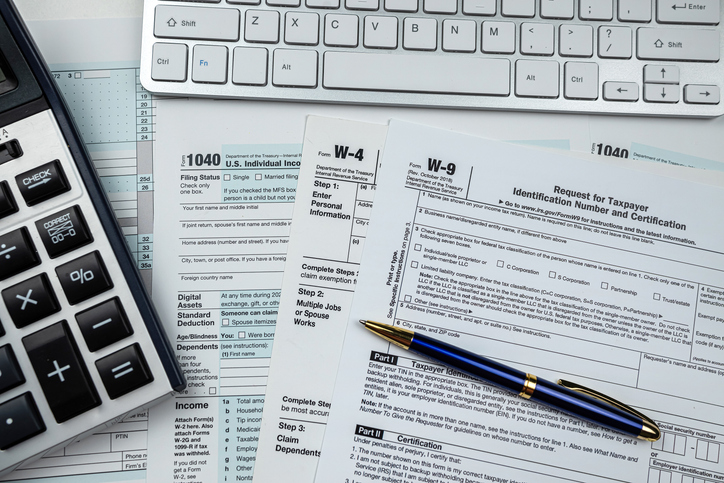In one way or another, taxes are a part of every American’s financial life. But for residents of Florida, Texas and seven other states with no income tax, they’re off the hook for state-level personal income taxes. Those living in Washington state won’t have to pay personal income taxes either, but they will face capital gains tax. While avoiding state income taxes may seem appealing, there’s often a catch, like high sales taxes.
Feeling overwhelmed by taxes? A financial advisor can help you optimize a tax strategy. Connect with a fiduciary advisor.
States With No Income Tax
Alaska
Alaska once had an income tax, but it was repealed in 1980. The state doesn’t have a sales tax, either (though some localities do charge a sales tax). What’s more, every resident receives extra money every year from the Alaska Permanent Fund Corporation.
Instead of collecting sales taxes and personal income taxes, the Alaska state government relies on other types of taxes (including excise and severance taxes) to fund its operations. Most of its revenue comes from gas production and oil drilling. However, due to the decline in oil prices, in 2023, the governor proposed that the personal income tax be reinstated to reduce its budget deficit, but it has yet to be reinstated.
Florida
While Florida’s personal income tax was repealed in 1855, its residents are required to pay other kinds of taxes, including corporate income taxes and sales taxes. The property taxes in Florida that local governments levy are also higher than in most other states.
Nevada
The Silver State has no trouble operating without a personal or corporate income tax. Thanks to the millions of tourists who visit the state each year, it manages to collect nearly a billion dollars from gambling taxes and fees. Nevada also gets its revenue from its high sales taxes (above 8% in some areas), sin taxes and taxes on the casino and hotel industries.
New Hampshire
While New Hampshire does not tax personal income. The state previously taxed dividends and interest, though this tax was gradually phased out in recent years and repealed to 0% as of Jan. 1, 2025.
South Dakota

South Dakota repealed its income tax in 1943, and all attempts to reinstate the tax have failed. To cover its costs, the Mount Rushmore State levies taxes on the purchases of cigarettes and alcoholic beverages. It even has coin-operated laundromat license fees.
Still, South Dakota is one of the most tax-friendly states, especially for retirees. Its sales tax rates are among the lowest in the nation and its average effective property tax rate is just above the national average. Personal and property taxes are collected by local governments and used to provide funding for public school systems and city- and county-level projects and services.
Tennessee
Tennessee does not tax any forms of income. This includes both wages earned through jobs and income from investments, dividends and interest. However, as recently as 2020, Tennessee did have an income tax, which was known as the Hall Income Tax. In 2016, the state’s governor signed a bill that reduced the Hall Income Tax rate on investment income gradually. It was completely eliminated for tax periods that begin on Jan. 1, 2021, and beyond.
In the meantime, the Volunteer State will continue to rely on its high sales tax rates and sin taxes for revenue. For example, beer vendors must pay a state tax of $1.29 for each gallon they sell – highest among all 50 states and Washington D.C.
Texas
The Texas Constitution forbids personal income taxes. Instead of collecting income taxes, Texas relies on high sales and use taxes. When paired with local taxes, total sales taxes in some jurisdictions are as high as 8.25%. Property tax rates in Texas are also high. Only a handful of states have higher property tax rates.
Washington
This state does not have personal or corporate income tax. But, you will have to pay tax on capital gains income, at a tiered rate of either 7% or 9%, depending on the amount of taxable income. However, certain deductions and exemptions do apply.
In addition, for those engaging in business, Washington imposes a business and occupation (B&O) and/or public utility tax, which is based on gross receipts.
Wyoming
If you want to live somewhere with low tax rates, you might want to consider moving to Wyoming. With no personal or corporate state income taxes, the Cowboy State also refrains from assessing any taxes on retirement income. Its average effective property tax rate is only about 0.55%, and a flat sales tax rate of 4%.
To make up for not having an income tax, Wyoming generates most of its revenue by levying property taxes and taxing businesses that produce natural resources, like coal.
Which States Tax Social Security and Retirement Accounts?
Where you live when you retire can have a major effect on your long-term retirement plans. This means that managing taxes is an important part of retirement planning, though choosing to live in a state with no income tax is just one option for retirees to consider. You might also select a state with favorable tax treatment of your retirement account withdrawals and Social Security benefits.
Here are all the states that don’t tax retirement account distributions whatsoever:
- Alaska
- Florida
- Illinois
- Iowa
- Mississippi
- Nevada
- New Hampshire
- Pennsylvania
- South Dakota
- Tennessee
- Texas
- Washington
- Wyoming
In addition to the above states, Alabama and Hawaii do not tax pension plan withdrawals. However, they do tax withdrawals made from 401(k)s and traditional individual retirement accounts (IRAs).
When it comes to Social Security, nine states tax Social Security to some degree:
- Colorado
- Connecticut
- Minnesota
- Montana
- New Mexico
- Rhode Island
- Utah
- Vermont
The Trade-Offs of Living in a No-Income-Tax State
States without personal income taxes often offset the missing revenue with other types of taxes that can significantly affect a household budget. Higher sales taxes, elevated property taxes or specialized excise taxes are common in many of these states. For example, Texas and Florida rely heavily on property and sales taxes, while Nevada and Tennessee collect substantial revenue through consumption taxes and industry-specific assessments.
Housing costs can also vary widely across no-income-tax states. A state may offer attractive tax treatment but have higher home prices or insurance costs, which can reduce or even outweigh the benefit of not paying income tax. This can be especially important to consider for retirees or those planning long-term residence, since property-related expenses may represent a major portion of the overall cost of living.
Some states with no income tax also impose other forms of taxation that residents may not expect. Washington, for instance, does not levy a personal income tax but does tax capital gains, and it applies a business and occupation (B&O) tax based on gross receipts rather than net profits. For people who own investments or operate businesses, these rules may create different financial outcomes than in a traditional income-tax state.
Local taxes add another layer. Although a state may not collect personal income tax, counties or municipalities may levy sales, lodging, tourism or utility taxes. These smaller taxes can contribute meaningfully to total annual expenses, and the structure varies significantly from one region to another.
Because the tax landscape differs across no-income-tax states, the financial impact depends on a person’s income sources, spending patterns and long-term plans. Comparing all tax categories, not just income tax, provides a clearer view of the overall financial environment in each state.
Bottom Line

Moving to one of the states with no income tax may seem like a great idea. But it’s important to find out whether you’ll have to pay additional taxes (like sales taxes and property taxes) in exchange for not having a personal income tax. If you’re moving to a state with no income tax, you probably want to see how your budget will be affected. If you want help assessing the potential impact on your finances, or you’re looking for some assistance to help you meet your financial goals in general, consider speaking to a financial advisor.
Tax Planning Tips
- Taxes claim a major portion of most Americans’ paychecks, even if they live in a state that has no income taxes. So if you want to create a long-term financial plan for you and your family, you’ll need to account for taxes. A financial advisor can be a great resource during the financial planning process. Finding a financial advisor doesn’t have to be hard. SmartAsset’s free tool matches you with vetted financial advisors who serve your area, and you can have a free introductory call with your advisor matches to decide which one you feel is right for you. If you’re ready to find an advisor who can help you achieve your financial goals, get started now.
- Check out SmartAsset’s annual roundup of the best tax filing software. This can help you get through tax season as painlessly as possible.
Photo credit: ©iStock.com/DKart, ©iStock.com/JMichl, ©iStock.com/AndreyPopov
